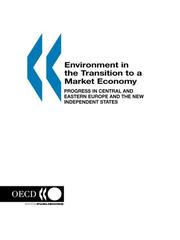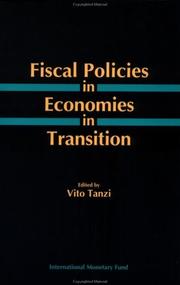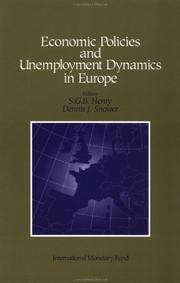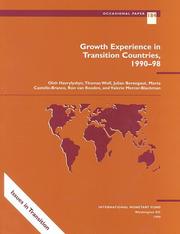| Listing 1 - 8 of 8 |
Sort by
|

ISBN: 926417110X 9786610081028 1280081023 9264173935 Year: 1999 Publisher: Paris : OECD Publishing,
Abstract | Keywords | Export | Availability | Bookmark
 Loading...
Loading...Choose an application
- Reference Manager
- EndNote
- RefWorks (Direct export to RefWorks)
Severe environmental problems were a key issue in the protests that marked the end of communist regimes in Central and Eastern Europe and the former Soviet Union. This groundbreaking book provides new insights into the interaction between economic policy reforms, environmental protection efforts and environmental conditions in the region's subsequent transition to market-based economies and democratic societies over the past eight to ten years. The unique contribution of the book is its synthesis of a vast amount of information and cumulative experience together with detailed examples and case studies to provide a coherent analysis of the challenges and achievements in institutional strengthening and policy reform, environmental policy instruments, environmental financing, and environmental management in enterprises. It also reviews the development of domestic public participation and international co-operation for the safeguarding of the region's environment and discusses trends in industrial pollution and biodiversity protection. The book shows that economic reforms provided a crucial stimulus for environmental improvement, leading to reductions in high pollution levels. Moreover, several countries have strengthened their domestic environmental policies, institutions, and financing, resulting in further improvements. Nonetheless, many serious problems remain, and others have grown worse over the transition period: in many countries of the former Soviet Union in particular, economic crises and political stagnation have impeded environmental protection efforts. Continued partnerships between governments of the region, OECD donor countries, international financial institutions and organisations, environmental NGOs, businesses and trade unions, as well as public support for these, will be essential to reinforce the environmental improvements achieved thus far.
614.7 <4-11> --- 338.24 (4-11) --- 338.24 (4-11) Instrumenten van de economische politiek. Economische orde. Economisch politieke maatregelen. Stabilisering. Stimuleringsmaatregelen. Regulering. Financiele steunmaatregelen--Oost-Europa --- Instrumenten van de economische politiek. Economische orde. Economisch politieke maatregelen. Stabilisering. Stimuleringsmaatregelen. Regulering. Financiele steunmaatregelen--Oost-Europa --- Pollutie van lucht, water, grond--(openbare gezondheidszorg)--Oost-Europa --- Environmental economics --- Environmental policy --- Economie de l'environnement --- Environnement --- Politique gouvernementale --- Economics --- Environment and state --- Environmental control --- Environmental management --- Environmental protection --- Environmental quality --- State and environment --- Environmental auditing --- Government policy --- Environmental aspects --- Economic aspects --- Environment --- Business & Economics --- Economic History
Book
ISBN: 0861870883 0861870875 Year: 1991 Publisher: London Royal Institute of International Affairs
Abstract | Keywords | Export | Availability | Bookmark
 Loading...
Loading...Choose an application
- Reference Manager
- EndNote
- RefWorks (Direct export to RefWorks)
Economic policy and planning (general) --- Eastern and Central Europe --- Czechoslovakia --- Hungary --- Poland --- Tchécoslovaquie --- Hongrie --- Pologne --- Economic policy --- Politics and government --- Politique économique --- Politique et gouvernement --- 338.24 (4-11) --- 815 Geschiedenis --- 830 Economie --- 838 Duurzame Ontwikkeling --- 841 Politiek Bestel --- 841.3 Politieke bewegingen --- 884.1 Oost-Europa --- europe de l'est --- reforme economique --- 330.540 --- 331.31 --- 331.32 --- CSR / Czechoslovakia - Tsjechoslowakije - Tchecoslovaquie --- EEU / Central & Eastern Europe --- HU / Hungary - Hongarije - Hongrie --- PL / Poland - Polen - Pologne --- Instrumenten van de economische politiek. Economische orde. Economisch politieke maatregelen. Stabilisering. Stimuleringsmaatregelen. Regulering. Financiele steunmaatregelen--Oost-Europa --- oost europa --- economische hervorming --- Socialistische stelsels: algemeenheden. --- Economisch beleid. --- Structuur van de economie. --- Geografie --- Sociale geografie --- Politieke Geografie. --- 338.24 (4-11) Instrumenten van de economische politiek. Economische orde. Economisch politieke maatregelen. Stabilisering. Stimuleringsmaatregelen. Regulering. Financiele steunmaatregelen--Oost-Europa --- Tchécoslovaquie --- Politique économique --- Socialistische stelsels: algemeenheden --- Economisch beleid --- Structuur van de economie

ISBN: 1557751919 9781455244645 1455244643 1283537036 9781283537032 1462316948 9781462316946 9786613849489 6613849480 1463925980 9781463925987 1616352396 9781616352394 9781557751911 1455291137 9781455291137 Year: 1992 Publisher: Washington, D.C.
Abstract | Keywords | Export | Availability | Bookmark
 Loading...
Loading...Choose an application
- Reference Manager
- EndNote
- RefWorks (Direct export to RefWorks)
The collapse of central economic planning in many countries and the breakup of the Soviet Union have put into disarray systems of government revenues and expenditures in those countries. This collection of 16 papers, edited by Vito Tanzi, analyzes the strengths and weaknesses of fiscal policies under the old system of central planning and suggests ways to revitalize those policies in the newly emerging market economies.
Post-communism --- Fiscal policy --- 336.2 <4-11> --- -Fiscal policy --- -Post-communism --- -338.24 (4-11) --- politique fiscale --- systemes economiques --- europe de l'est --- AFR / Africa - Afrika - Afrique --- ASI / Asia - Azië - Asie --- EEU / Central & Eastern Europe --- 336.61 --- Transition economics --- -336.30947 --- Postcommunism --- World politics --- Communism --- Tax policy --- Taxation --- Economic policy --- Finance, Public --- 338.24 (4-11) Instrumenten van de economische politiek. Economische orde. Economisch politieke maatregelen. Stabilisering. Stimuleringsmaatregelen. Regulering. Financiele steunmaatregelen--Oost-Europa --- Instrumenten van de economische politiek. Economische orde. Economisch politieke maatregelen. Stabilisering. Stimuleringsmaatregelen. Regulering. Financiele steunmaatregelen--Oost-Europa --- 336.2 <4-11> Belastingen. Belastingswezen. Openbare financien. Belastingspolitiek. Belastingstheorie. Belastingsharmonisatie. Fiskale politiek. Belastingsleer. Belastingsdruk. Belastingstechniek. Belastingsstelsel.Belastingstarief--Oost-Europa --- 336.2 <4-11> Belastingsakkoorden. Belastingswezen--Oost-Europa --- Belastingen. Belastingswezen. Openbare financien. Belastingspolitiek. Belastingstheorie. Belastingsharmonisatie. Fiskale politiek. Belastingsleer. Belastingsdruk. Belastingstechniek. Belastingsstelsel.Belastingstarief--Oost-Europa --- Belastingsakkoorden. Belastingswezen--Oost-Europa --- fiscaal beleid --- economische systemen --- oost europa --- Financieel beleid. --- Government policy --- Politique fiscale --- Postcommunisme --- 336.30947 --- 338.24 (4-11) --- Financieel beleid --- Budgeting --- Exports and Imports --- Macroeconomics --- Public Finance --- Taxation, Subsidies, and Revenue: General --- National Budget --- Budget Systems --- Business Taxes and Subsidies --- National Government Expenditures and Related Policies: General --- Debt --- Debt Management --- Sovereign Debt --- Public finance & taxation --- Budgeting & financial management --- Privatization --- International economics --- Budget planning and preparation --- Expenditure --- Value-added tax --- Income --- Tax administration core functions --- Public financial management (PFM) --- Taxes --- National accounts --- Revenue administration --- Income tax --- Budget --- Expenditures, Public --- Spendings tax --- Debts, Public --- Hungary

ISBN: 9781455281978 1455281972 1557751994 9781557751997 1455286249 1455297194 1283535033 9786613847485 Year: 1992 Publisher: Washington [D.C.] [Vienna]
Abstract | Keywords | Export | Availability | Bookmark
 Loading...
Loading...Choose an application
- Reference Manager
- EndNote
- RefWorks (Direct export to RefWorks)
The experience of Central and Eastern European countries with moving from centrally planned to open-market economies is examined in this collection of papers given at an April 1991 seminar, moderated by Georg Winckler and organized by the IMF and the Austrian National Bank.
Europe, Central --- Europe, Eastern --- East Europe --- Eastern Europe --- Central Europe --- Economic policy --- E-books --- 338.24 <4-11> --- 330.94 --- 330.540 --- 330.548 --- 330.580 --- 331.31 --- 338.047 --- EEU / Central & Eastern Europe --- 338.24 (4-11) --- 338.24 (4-11) Instrumenten van de economische politiek. Economische orde. Economisch politieke maatregelen. Stabilisering. Stimuleringsmaatregelen. Regulering. Financiele steunmaatregelen--Oost-Europa --- Instrumenten van de economische politiek. Economische orde. Economisch politieke maatregelen. Stabilisering. Stimuleringsmaatregelen. Regulering. Financiele steunmaatregelen--Oost-Europa --- Socialistische stelsels: algemeenheden --- Nationalisatie. Privatiseringen --- Gecontroleerde economie. Geleide economie. Welvaarststaat. Algemeenheden --- Economisch beleid --- Privé en openbare bedrijven. Openbare diensten. Gemengde economie --- Congresses. --- Finance: General --- Inflation --- Labor --- Macroeconomics --- Taxation --- Exports and Imports --- Investments: General --- Wages, Compensation, and Labor Costs: General --- Comparison of Public and Private Enterprises and Nonprofit Institutions --- Privatization --- Contracting Out --- Labor Economics: General --- Employment --- Unemployment --- Wages --- Intergenerational Income Distribution --- Aggregate Human Capital --- Aggregate Labor Productivity --- Human Capital --- Skills --- Occupational Choice --- Labor Productivity --- Labour --- income economics --- Public finance & taxation --- Finance --- International economics --- Human capital --- Economic sectors --- Labor economics --- Economic theory --- Saving and investment --- Germany --- Income economics
Book
ISBN: 1557755019 9781557755018 1475585470 1475557531 1299395201 Year: 1995 Publisher: Rome Banca d'Italia
Abstract | Keywords | Export | Availability | Bookmark
 Loading...
Loading...Choose an application
- Reference Manager
- EndNote
- RefWorks (Direct export to RefWorks)
The recent global financial crisis has forced a re-examination of risk transmission in the financial sector and how it affects financial stability. Current macroprudential policy and surveillance (MPS) efforts are aimed establishing a regulatory framework that helps mitigate the risk from systemic linkages with a view towards enhancing the resilience of the financial sector. This paper presents a forward-looking framework ("Systemic CCA") to measure systemic solvency risk based on market-implied expected losses of financial institutions with practical applications for the financial sector risk management and the system-wide capital assessment in top-down stress testing. The suggested approach uses advanced contingent claims analysis (CCA) to generate aggregate estimates of the joint default risk of multiple institutions as a conditional tail expectation using multivariate extreme value theory (EVT). In addition, the framework also helps quantify the individual contributions to systemic risk and contingent liabilities of the financial sector during times of stress.
338.24 <4> --- 338.24 <4-15> --- CIS / Commonwealth Of Independant States - Gos - Cei --- 338 (4) --- 338.24 (4-11) --- EEU / Central & Eastern Europe --- EUR / Europe - Europa --- AT / Austria - Oostenrijk - Autriche --- CH / Switzerland - Zwitserland - Suisse --- DE / Germany - Duitsland - Allemagne --- IT / Italy - Italië - Italie --- PT / Portugal --- 382.51 --- 338.313 --- 330.52 --- 331.32 --- 380.23 --- 337.4047 --- 338.24 (4-11) Instrumenten van de economische politiek. Economische orde. Economisch politieke maatregelen. Stabilisering. Stimuleringsmaatregelen. Regulering. Financiele steunmaatregelen--Oost-Europa --- Instrumenten van de economische politiek. Economische orde. Economisch politieke maatregelen. Stabilisering. Stimuleringsmaatregelen. Regulering. Financiele steunmaatregelen--Oost-Europa --- 338 (4) Economische situatie. Economische structuur van bepaalde landen en gebieden. Economische geografie. Economische produktie.economische produkten. Economische diensten--Europa --- Economische situatie. Economische structuur van bepaalde landen en gebieden. Economische geografie. Economische produktie.economische produkten. Economische diensten--Europa --- 338.24 <4-15> Instrumenten van de economische politiek. Economische orde. Economisch politieke maatregelen. Stabilisering. Stimuleringsmaatregelen. Regulering. Financiele steunmaatregelen--West-Europa --- Instrumenten van de economische politiek. Economische orde. Economisch politieke maatregelen. Stabilisering. Stimuleringsmaatregelen. Regulering. Financiele steunmaatregelen--West-Europa --- 338.24 <4> Instrumenten van de economische politiek. Economische orde. Economisch politieke maatregelen. Stabilisering. Stimuleringsmaatregelen. Regulering. Financiele steunmaatregelen--Europa --- Instrumenten van de economische politiek. Economische orde. Economisch politieke maatregelen. Stabilisering. Stimuleringsmaatregelen. Regulering. Financiele steunmaatregelen--Europa --- Aard, belang en evolutie. Handelsbalans. J curve. --- Kapitalisme. --- Liberaal systeem. Neo-liberalisme. Theorie van de onderhandeling. --- Structuur van de economie. --- Vorming van internationale prijzen. Internationale gelijkheden en verschillen. Concurrentievermogen. --- Europe --- Europe, Eastern --- Former Soviet republics --- -CIS countries --- Commonwealth of Independent States countries --- Ex-Soviet republics --- Ex-Soviet states --- Former Soviet states --- New Independent States (Former Soviet republics) --- Newly Independent States (Former Soviet republics) --- NIS (Former Soviet republics) --- East Europe --- Eastern Europe --- Council of Europe countries --- Eastern Hemisphere --- Eurasia --- Foreign economic relations --- -Case studies --- -Foreign economic relations --- -Economic conditions. Economic development --- Russia --- Financial crises --- Risk management --- Insurance --- Management --- Crashes, Financial --- Crises, Financial --- Financial crashes --- Financial panics --- Panics (Finance) --- Stock exchange crashes --- Stock market panics --- Crises --- E-books --- Aard, belang en evolutie. Handelsbalans. J curve --- Kapitalisme --- Liberaal systeem. Neo-liberalisme. Theorie van de onderhandeling --- Structuur van de economie --- Vorming van internationale prijzen. Internationale gelijkheden en verschillen. Concurrentievermogen --- -Financial crises. --- Risk management. --- Systemic risk. --- Economic conditions. Economic development --- Financial crises. --- -Eastern Hemisphere --- CIS countries --- -Financial crises --- Congresses. --- -338.24 <4> --- Accounting --- Exports and Imports --- Finance: General --- Financial Risk Management --- Public Finance --- Specific Distributions --- Model Construction and Estimation --- Financial Crises --- Contingent Pricing --- Futures Pricing --- option pricing --- Banks --- Depository Institutions --- Micro Finance Institutions --- Mortgages --- Financial Institutions and Services: Government Policy and Regulation --- General Financial Markets: Government Policy and Regulation --- Public Administration --- Public Sector Accounting and Audits --- International Lending and Debt Problems --- International Financial Markets --- Finance --- Public finance & taxation --- International economics --- Financial reporting, financial statements --- Systemic risk --- Contingent liabilities --- Debt default --- Asset valuation --- Financial statements --- Financial sector policy and analysis --- Public financial management (PFM) --- External debt --- Asset and liability management --- Financial risk management --- Fiscal policy --- Debts, External --- Asset-liability management --- Finance, Public --- United States --- Option pricing --- Soviet Union

ISBN: 1557755787 9781455294091 1455294098 9781557755780 1455275131 1455281050 1283536439 9786613848888 Year: 1996 Publisher: [Washington, D.C., U.S.A.]
Abstract | Keywords | Export | Availability | Bookmark
 Loading...
Loading...Choose an application
- Reference Manager
- EndNote
- RefWorks (Direct export to RefWorks)
This book, edited by S.G.B. Henry and Dennis J. Snower, examines the high unemployment that has plagued five European countries- France, Germany, Italy, Spain, and the United Kingdom- for more than a decade. Its methodology focuses on the mechanisms that prevent employers and employees from adjusting promptly to changing market opportunities. Chief among these mechanisms are outdated economic structures, the power of labor unions, rising nonwage labor costs, and the disparity between unemployed workers and available jobs. Although cross-country differences indicate that there is no common cause for joblessness in Europe, the book discusses a unique characteristic of the European labor market- that unemployment not only rises during recessions, but does not fall when economic weaknesses are overcome.
Macroeconomics --- Europe --- 338.24 <4> --- 331.57 <4> --- Labor market --- -Labor policy --- -Unemployment --- -EEC / European Union - EU -Europese Unie - Union Européenne - UE --- DE / Germany - Duitsland - Allemagne --- ES / Spain - Spanje - Espagne --- FR / France - Frankrijk --- GB / United Kingdom - Verenigd Koninkrijk - Royaume Uni --- IT / Italy - Italië - Italie --- 334.151.1 --- 332.630 --- 334.151.54 --- 332.620 --- 336.748.8 IMF --- 331.6.001 --- Joblessness --- Employment (Economic theory) --- Full employment policies --- Labor supply --- Manpower policy --- Right to labor --- Underemployment --- Labor --- State and labor --- Economic policy --- Employees --- Market, Labor --- Supply and demand for labor --- Markets --- Instrumenten van de economische politiek. Economische orde. Economisch politieke maatregelen. Stabilisering. Stimuleringsmaatregelen. Regulering. Financiele steunmaatregelen--Europa --- Werkloosheidsbestrijding. Werkgelegenheidssubsidies--Europa --- EG : economisch en monetair beleid. --- Strijd tegen de werkloosheid: algemeen. Theorie en beleid van de werkgelegenheid. Volledige werkgelegenheid. --- Werkgelegenheid en werkloosheid in de Europese Gemeenschappen. --- Werkloosheid: algemeenheden. Philipscurve. --- Internationaal Monetair Fonds - IMF --- arbeidsmarktbeleid - arbeidsmarktbeheersing --- Government policy --- Supply and demand --- Labor policy --- Unemployment --- Chômage --- Travail --- Marché du travail --- Politique gouvernementale --- 331.57 <4> Werkloosheidsbestrijding. Werkgelegenheidssubsidies--Europa --- 338.24 <4> Instrumenten van de economische politiek. Economische orde. Economisch politieke maatregelen. Stabilisering. Stimuleringsmaatregelen. Regulering. Financiele steunmaatregelen--Europa --- Chômage --- Marché du travail --- EEC / European Union - EU -Europese Unie - Union Européenne - UE --- Werkloosheid: algemeenheden. Philipscurve --- Strijd tegen de werkloosheid: algemeen. Theorie en beleid van de werkgelegenheid. Volledige werkgelegenheid --- EG : economisch en monetair beleid --- Werkgelegenheid en werkloosheid in de Europese Gemeenschappen --- Aggregate Human Capital --- Aggregate Labor Productivity --- Demand and Supply of Labor: General --- Economic theory --- Employment --- Income economics --- Intergenerational Income Distribution --- Labor Force and Employment, Size, and Structure --- Labor force --- Labor markets --- Labour --- Minimum wage --- Real wages --- Unemployment: Models, Duration, Incidence, and Job Search --- Wages --- Wages, Compensation, and Labor Costs: General --- United Kingdom

ISBN: 1557758034 1455261971 145276915X Year: 1999 Publisher: Washington, D.C. International Monetary Fund
Abstract | Keywords | Export | Availability | Bookmark
 Loading...
Loading...Choose an application
- Reference Manager
- EndNote
- RefWorks (Direct export to RefWorks)
This study, another in the series focusing on special issues in transition, reviews the experience of output decline and recovery in the 25 countries of eastern and central Europe and the Baltics, Russia, and other countries of the former Soviet Union. Although these countries began the process of economic transformation with similar circumstances of output decline, the extent of decline, its duration, and the sustainability of recovery in growth varied considerably. The authors explore the factors behind this variation and find that the most important policies promoting early and sustained recovery were ones that supported financial stabilization and structural reforms in key areas such as private sector development, the tax system, economic liberalization, and secure property rights.
330.05 --- 338.947 --- 331.32 --- 333.432.8 --- 338.341.0 --- 338.8 --- EEU / Central & Eastern Europe --- RU / Russia - Rusland - Russie --- 338.24 (4-11) --- 338.24 <47> --- 338 <4-11> --- 338 (47) --- 338.24 (4-11) Instrumenten van de economische politiek. Economische orde. Economisch politieke maatregelen. Stabilisering. Stimuleringsmaatregelen. Regulering. Financiele steunmaatregelen--Oost-Europa --- Instrumenten van de economische politiek. Economische orde. Economisch politieke maatregelen. Stabilisering. Stimuleringsmaatregelen. Regulering. Financiele steunmaatregelen--Oost-Europa --- 338 (47) Economische situatie. Economische structuur van bepaalde landen en gebieden. Economische geografie. Economische produktie.economische produkten. Economische diensten--Rusland. Sovjet-Unie --- Economische situatie. Economische structuur van bepaalde landen en gebieden. Economische geografie. Economische produktie.economische produkten. Economische diensten--Rusland. Sovjet-Unie --- 338.24 <47> Instrumenten van de economische politiek. Economische orde. Economisch politieke maatregelen. Stabilisering. Stimuleringsmaatregelen. Regulering. Financiele steunmaatregelen--Rusland. Sovjet-Unie --- Instrumenten van de economische politiek. Economische orde. Economisch politieke maatregelen. Stabilisering. Stimuleringsmaatregelen. Regulering. Financiele steunmaatregelen--Rusland. Sovjet-Unie --- 338 <4-11> Economische situatie. Economische structuur van bepaalde landen en gebieden. Economische geografie. Economische produktie.economische produkten. Economische diensten--Oost-Europa --- Economische situatie. Economische structuur van bepaalde landen en gebieden. Economische geografie. Economische produktie.economische produkten. Economische diensten--Oost-Europa --- Structuur van de economie --- Internationale monetaire organisatie. Internationaal Muntfonds. Algemene leningovereenkomsten --- Internationale hulp: algemeenheden --- Economische groei --- Europe, Central --- Europe, Eastern --- Former Soviet republics --- CIS countries --- Commonwealth of Independent States countries --- Ex-Soviet republics --- Ex-Soviet states --- Former Soviet states --- New Independent States (Former Soviet republics) --- Newly Independent States (Former Soviet republics) --- NIS (Former Soviet republics) --- East Europe --- Eastern Europe --- Central Europe --- Economic conditions --- Econometric models. --- Working papers --- Business cycles --- History of Eastern Europe --- Exports and Imports --- Labor --- Macroeconomics --- Agribusiness --- Production and Operations Management --- Institutions and the Macroeconomy --- Labor Economics: General --- Comparison of Public and Private Enterprises and Nonprofit Institutions --- Privatization --- Contracting Out --- International Investment --- Long-term Capital Movements --- Macroeconomics: Production --- Labour --- income economics --- Finance --- International economics --- Structural reforms --- Foreign direct investment --- Productivity --- Macrostructural analysis --- Economic sectors --- Balance of payments --- Production --- Labor economics --- Investments, Foreign --- Industrial productivity --- Russian Federation --- Income economics
Book
ISBN: 9061528089 Year: 1993 Volume: vol 6 Publisher: Leuven Davidsfonds
Abstract | Keywords | Export | Availability | Bookmark
 Loading...
Loading...Choose an application
- Reference Manager
- EndNote
- RefWorks (Direct export to RefWorks)
Economic order --- Political parties --- Political sociology --- Eastern and Central Europe --- Buitenlandse politiek --- Economie --- Europa --- Europe --- Politique extérieure --- 330.342.14 --- 321.7 <4-11> "1990" --- 321 <4-11> --- 330.342 <4-11> --- Europe, Eastern --- -Post-communism --- -Privatization --- -841.1 Democratisering --- 830 Economie --- 884.1 Oost-Europa --- Academic collection --- 338.24 (4-11) --- #SBIB:328H27 --- #SBIB:328H262 --- #SBIB:328H263 --- 323 --- 338.242 --- (4-11) --- $?$93/02 --- 321.7 <4-11> --- 342.34 <4-11> --- 330.342.14 <4-11> --- 330.342 --- 329 --- 301.188.2 --- Oost- en Centraal-Europa --- democratie --- vrije markteconomie --- oost europa --- EEU / Central & Eastern Europe --- SU / Soviet Union - Ussr - Urss --- 321.4 --- 330.581 --- 330.52 --- 330.548 --- 330.541 --- 331.32 --- 331.12 --- Democratie --- Midden-Europa --- Oost-Europa --- Denationalization --- Privatisation --- Contracting out --- Corporatization --- Government ownership --- Postcommunism --- World politics --- Communism --- Kapitalistische economie. Free enterprise. Markteconomie. Vrije concurrentie --- Democratie. Plurale samenleving. Pluralisme. Democratische pluraliteit--(moderne democratie politieke stelsels)--Oost-Europa--?"1990" --- Politieke organisatie. Staten als politieke machten. Regeringsvormen--Oost-Europa --- Economische ontwikkeling. Groeistadia--Oost-Europa --- Politics and government --- -Instrumenten van de economische politiek. Economische orde. Economisch politieke maatregelen. Stabilisering. Stimuleringsmaatregelen. Regulering. Financiele steunmaatregelen--Oost-Europa --- Instellingen en beleid: Midden- en Centraal Europa: algemeen --- Instellingen en beleid: Rusland en het GOS --- Instellingen en beleid: andere GOS-staten --- Economische orde --- Politieke partijen --- Sociologie van de politiek --- economie de marche libre --- europe de l'est --- Democratie. --- Experimenten. Plannen. --- Liberaal systeem. Neo-liberalisme. Theorie van de onderhandeling. --- Nationalisatie. Privatiseringen. --- Staatssocialisme. --- Structuur van de economie. --- 338.24 (4-11) Instrumenten van de economische politiek. Economische orde. Economisch politieke maatregelen. Stabilisering. Stimuleringsmaatregelen. Regulering. Financiele steunmaatregelen--Oost-Europa --- Instrumenten van de economische politiek. Economische orde. Economisch politieke maatregelen. Stabilisering. Stimuleringsmaatregelen. Regulering. Financiele steunmaatregelen--Oost-Europa --- 330.342 <4-11> Economische ontwikkeling. Groeistadia--Oost-Europa --- 321 <4-11> Politieke organisatie. Staten als politieke machten. Regeringsvormen--Oost-Europa --- 321.7 <4-11> "1990" Democratie. Plurale samenleving. Pluralisme. Democratische pluraliteit--(moderne democratie politieke stelsels)--Oost-Europa--?"1990" --- 330.342.14 Kapitalistische economie. Free enterprise. Markteconomie. Vrije concurrentie --- Post-communism --- Privatization --- 841.1 Democratisering --- Liberaal systeem. Neo-liberalisme. Theorie van de onderhandeling --- Staatssocialisme --- Nationalisatie. Privatiseringen --- Experimenten. Plannen --- Structuur van de economie
| Listing 1 - 8 of 8 |
Sort by
|

 Search
Search Feedback
Feedback About UniCat
About UniCat  Help
Help News
News